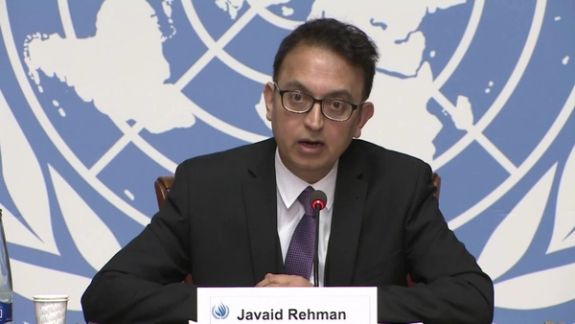‘Cease Arbitrary Detentions’ Of Iranians, Says US State Department

Iran systematically summons, interrogates and often detains family members of dissidents, who are either themselves in prison, killed during protests or fled abroad.

Iran systematically summons, interrogates and often detains family members of dissidents, who are either themselves in prison, killed during protests or fled abroad.
A group of prominent Iranian human rights activists and dissidents issued a public letter and petition, urging Javaid Rehman, the UN’s Special Rapporteur on Human Rights in Iran, to secure the release of recently imprisoned political activists’ and journalists’ family members in Iran.
The letter titled “Condemning the Iranian Government’s Detainment of Political Activists’ and Journalists’ Family Members, and Discrimination Based on Ethnicity and Gender” was published in July in English and Persian.
When asked about the letter, a spokesperson for the US State Department told Iran International, “We are aware of this case and will continue to monitor its developments. We once again call on Iranian authorities to cease the arbitrary detentions. Iranian authorities have repeatedly violated Iranians’ human rights and punished them for exercising their fundamental freedoms. “

The US spokesperson added “While charges in this case have not been announced, sham trials and executions are key components of the regime’s attempt to suppress any form of dissent.The United States continues to coordinate with allies and partners to hold Iranian authorities accountable for their human rights abuses.”
The letter noted that in early July, “news emerged of the arrest of Saman Pashai[sic]. Pashai, a Kurdish citizen and the world’s third-ranked junior wrestling champion is Sardar Pashaei's brother, a former World Wrestling Champion and national team coach. Sardar Pashai had notably spoken out against the Islamic Republic since the death sentence of Navid Afkari, a former wrestling champion in Iran and a protester against the regime.”
The letter continued: “On September 23, 2022, Latifeh Pashai (Layla Saghezi), a women’s rights activist and Sardar Pashaei’s sister, was detained and interrogated about her brother’s activities. Security agents had previously summoned and questioned Sardar Pashaei’s parents.”
Sardar Pashaei told Iran International that“By arresting my younger brother, who is a professor and a wrestling champion, the authoritarian Islamic regime is sending my family and me a message: ‘Be quiet. Don’t criticize the regime. Don’t create problems.’”

He continued that “The government's ploys to silence us, either by holding our loved ones hostage or sending its mercenaries to kill us, will not help them keep power. Iranian authorities are now using arrests and in some cases the death penalty as a tool of political repression—but we have a message for the regime: We will not give up our fight for freedom.”
According to the letter, on “June 18, 2023, agents from the Iranian Ministry of Intelligence blocked the entryway to Iranshahr in the Sistan and Baluchistan province. They subsequently arrested Amer Dadafarin, the 18-year-old son of Fariba Baluch, and Mohammad Mollazehi, the 25-year-old brother of the same, both relatives of the Baluch human rights activist. Their whereabouts remain undisclosed.“
Speaking from Britain on WhatsApp with Iran International, Fariba Baluch said “They arrested my son and brother for nothing. Just for my activities.” Baluch is an outspoken critic of the Iranian regime’s repression of people in Baluchestan.
Iranian regime security forces murdered more than 100 people in Zahedan, the provincial capital of Iran’s Sistan-Baluchistan, in the autumn of 2022 in what has become known as “Bloody Friday.”
Baluch spoke in April in the European Parliament and said: “Over 20 of those killed in the protests were children under 18. Baloch were killed, wounded, arrested and suppressed more violently than anywhere else in Iran.”
She added “Being a woman on one hand and a Baluch on the other hand, means systematic and double discrimination against them, as the women of Balochestan not only suffer from the religious government policies, but also local social/cultural oppressions more than any other region in Iran.”
The public letter was authored by Lily Pourzand, women and gender issues professional; Parvaneh Hosseini, lecturer and civil activist; Moein Khazaeli, lawyer; Samaneh Savadi, gender equality activist; Hamed Farmand, children’s rights activist; and Nasim Mogharab (Sahra), women’s rights activist.
When asked about the letter, a spokesman for United Nations Security General António Guterres referred Iran International to Ravina Shamdasani, a UN Human Rights Spokesperson for Rehman, the UN’s Special Rapporteur on Human Rights in Iran Affairs.Shamdasani did not immediately respond.
Iran International reached out to the International Olympic Committee and United World Wrestling. Hualan Jiang, a representative for the IOC, referred Iran International to the IOC press office. The IOC declined to comment. Iran International also contacted Human Rights Watch and HRW’s Director of Global Initiatives, Minky Worden, who deals with the persecution of athletes. A HRW spokesperson wrote, “We regret to inform you that we are unable to meet your deadline due to the availability of our experts. Apologies for the inconvenience this has caused, but we hope to be more accommodating of future requests. We wish the best of luck with your reporting and hope to hear from you in the future.”
Iran International offered to extend the filing of its article to HRW to secure a comment. HRW and Worden declined to comment. Critics argue that HRW failed to intervene prior to the execution of Navid Afkari. On the day that Iran’s regime hanged Afkari, HRW issued a statement.